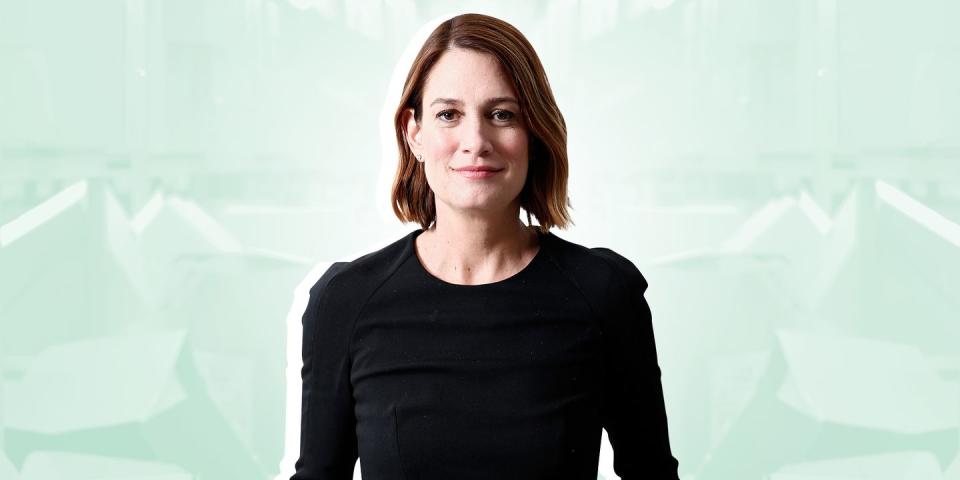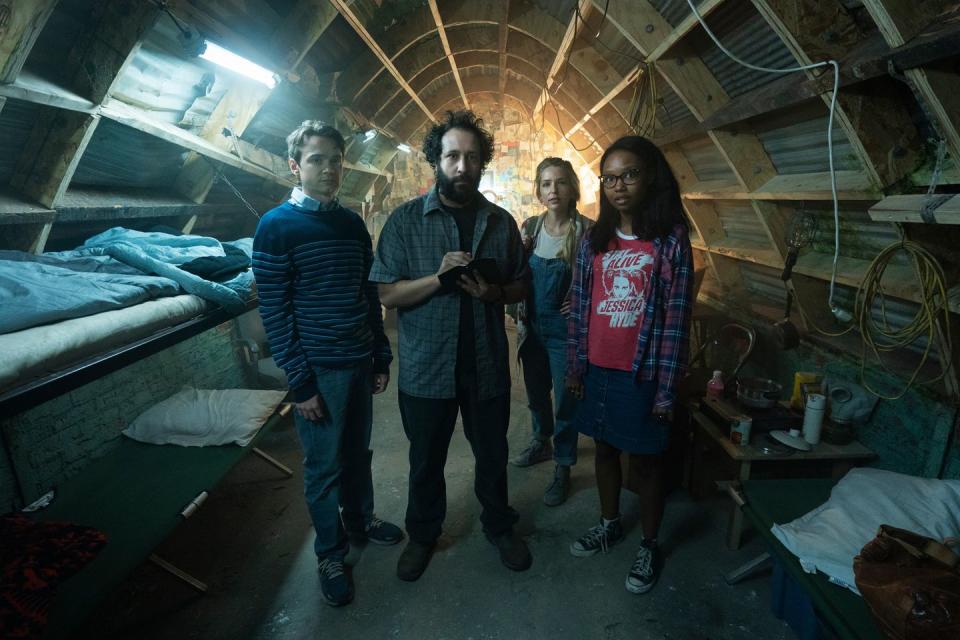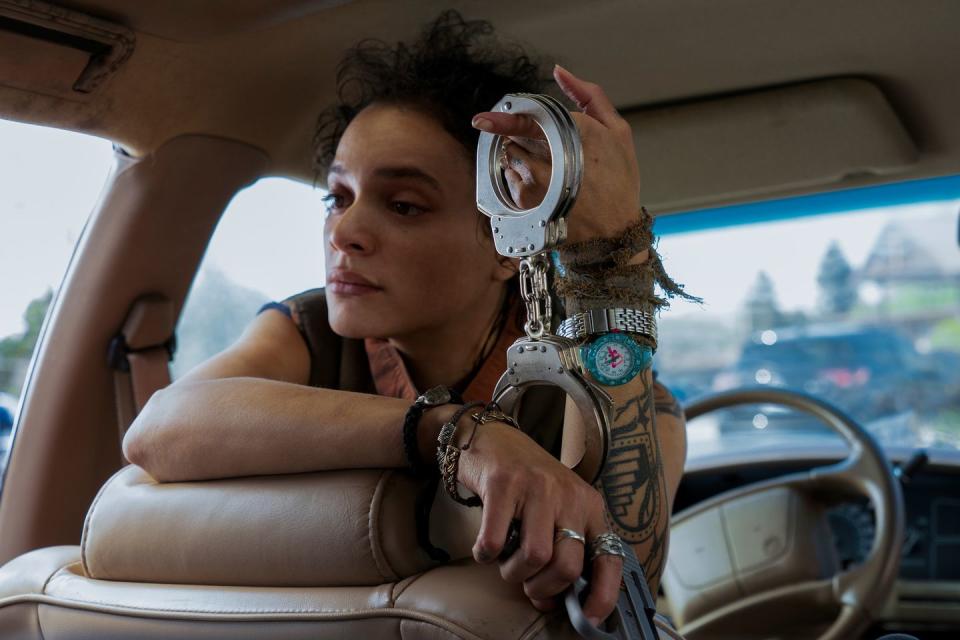In 'Utopia,' Gillian Flynn's New Show, Being a Fan Could Save the World

Gone Girl: The Musical would be dark—that’s a given. It would be violent, bleak, and blood-splattered, with the apex of the night occurring when the voice of cool, calculating Amy Dunne soars all the way to the cheap seats during a bring-down-the-house eleven o’clock number. Adapted from Gillian Flynn’s runaway bestseller, it would undoubtedly pack seats for months, with legions of Flynn fanatics turning out to watch their favorite anti-heroine belt her way through the novel’s familiar twists and turns. There’s just one problem: Gone Girl: The Musical isn’t happening anytime soon, even if Flynn has thought about it.
“I think it would be a rock opera—a deep, dark rock opera,” Flynn said. “I’d love it. I’m the biggest musical lover in the world.”
Flynn had a chance to contemplate Gone Girl: The Musical during the making of Utopia, her new Amazon Studios series (and her first outing as a television showrunner), in which eagle-eyed fans can catch a glimpse of the would-be musical on a Chicago marquee. Adapted from a 2013 British television series by the same name, Utopia centers on a tightly-knit group of uber-knowledgeable superfans, who are shocked to learn that their favorite comic isn’t just real, but it holds the secrets to the public health conspiracy of the century. In an early episode of the series, Flynn had an empty marquee to fill, with The Chicago Theater’s landmark lights gleaming in the background of a scene where two characters stumble down North State Street. Flynn hoped to fill the space with an easter egg, maybe even a cheeky nod to her beloved city of Chicago, but landing the rights to other pop culture properties proved challenging—until she had a breakthrough.
“As it turns out, getting rights is so complicated,” Flynn said, of her quest to get the name of an existing musical on the marquee. “I threw out about twenty possibilities, and I got rejected over and over. Eventually we were getting down to the wire, and I finally said, ‘Hey, I know who will give us rights. I will.’”
There you have it: Ms. Flynn said she would give the rights herself, and Gone Girl: The Musical landed on the marquee. What may seem on its surface like winky, self-referential fan service is in fact a fitting grace note for Utopia, a conspiracy thriller about a band of comic book superfans tasked with saving the world. For Flynn, a self-described “professional fan” whose career has taken her from beat journalism at toilet seat conventions to the highest echelons of literary Hollywood, Utopia is something of a creative homecoming. After all, Flynn’s enduring love for fan culture is a family affair. Flynn’s father, a professor of film studies, made part of his living by finding and selling rare comic books, meaning that Flynn was steeped in fandom from a young age.
“That was what we did on weekends—pile into the family station wagon, then go to flea markets and comic conventions,” Flynn said. “In Kansas City, there’s a great convention called Fool Con. That was always the highlight of my year.”
Flynn first came aboard Utopia in 2014, when David Fincher, who directed the film adaptation of Gone Girl, tapped her to write the scripts. Budget disputes tanked Utopia’s future at HBO, with Fincher departing from the project, but Flynn salvaged the bones for a second life at Amazon Studios, stepping in to carry her writing over the finish line as showrunner and executive producer. Flynn, who ate, slept, and breathed fandom as Entertainment Weekly’s television critic during the early aughts, came to the project deeply fluent in the language of fans.

“Having literally made my living as a fan for awhile, I love fans, because I love people who have passion for anything, whether it's comic books or model trains,” Flynn said. “I love people who love their stuff, because I don't think there's a lot of unbridled and genuine passion in the world.”
Flynn herself is a woman of unbridled and genuine passion—for musical theater, for feminist literature, for comic books (she wrote one, called Masks, in 2015), and, believe it or not, for dressing up in Renaissance-era garb.
“I’m a big Renaissance fair person,” Flynn said. “I get dressed up every year. Even my kids have outfits, and every once in awhile, my husband will be a good sport and wear his Henry VIII outfit. We go to a great Ren Fest outside of Chicago every year. There’s another one in Kansas City that I grew up going to, so I’m very much steeped in that.”
But fandom, for all its dizzying highs, has staggering lows. Much ink has been spilled about toxic fandom, while the dismal precedents established during Gamergate still continue to animate today’s online culture wars. In Utopia, Flynn doesn’t shy away from the dark side of fandom, highlighting the tendency of her unlikely heroes to devolve into uncritical hero worship, as well as a dangerous myopia. Jessica Hyde, the comic book heroine who proves to exist as a real person rather than just a fiction, criticizes Utopia’s band of geeks for living what she perceives as meaningless lives, characterized by “small jobs and tiny apartments and phone screens with texts always chirping.” She goes on to shout, “Your only passion is sitting in your bedrooms, talking about a world I was actually living in.” For Flynn, this narrow-minded tunnel vision is fandom’s chief danger.

“As much intellectual power and passion as you can put into things that you love, there’s still a really big world out there,” Flynn said. “There are a lot of things to learn and explore and expose yourself to. You can get overly focused on certain things and make judgments about people who love one thing and not the other, to a degree where it’s exclusionary. It’s about finding that moderation. Enjoy the stuff you enjoy, but leave that room in your life to find new things to love, too.”
Though inhabiting fan culture was treading familiar ground for Flynn, stepping into the driver’s seat on Utopia was a bold new adventure. Credited as the showrunner and executive producer of Utopia, as well as the scribe behind all eight episodes, Flynn was tasked with an unprecedented amount of ownership over this project.
“It felt very big and challenging,” Flynn said. “I didn't entirely know what running a show entailed, having never done it before. I didn’t get into TV in the usual manner that most people do, where you’re used to being in the writers’ room and on set, seeing a showrunner in action. For me, it was trial by fire.”
Despite the challenge of learning on the job, Flynn took to one element of showrunning right away: the visuals. Flynn, who has written three novels (Gone Girl, Sharp Objects, and Dark Places) brought her novelist’s toolkit to location scouting and prop selection, so much so that, in her next life, she believes she’ll come back as a prop master. Her painterly touch is evident throughout the series, with each set constructed from a colorful phantasmagoria of telling details.
“In my writing, each character will notice certain things, whether it’s something in the room behind a person or a certain visual aesthetic,” Flynn said. “I realized that this was exactly what I’d be doing on screen—telling the story through more than just dialogue and action, but through visuals, which really further a character’s personality. Do they have family photos behind them? What kind of art do they like? What kind of house do they live in?”
Yet one thing Flynn couldn’t prepare for was the shock of releasing Utopia, a show about a comic book that predicts global epidemics, into a world ravaged by COVID-19.
“I remember when I was selling the show, and everyone was trying to wrap their brains around the idea of this world-shaking virus,” Flynn said. "They kept asking, ‘Will people believe it?’ And, ‘Is this pure science fiction?’”

Filming on Utopia wrapped in October 2019. In the five months to follow, Flynn regularly commuted from Chicago to Los Angeles to work through the editing process. In January, with COVID-19 beginning to make international headlines, the editing bay was often filled with what Flynn describes as “uncomfortable, uneasy” laughter. Come March, with cities across the nation shutting down and life as we knew it grinding to a halt, Flynn finished the show from her laptop in Chicago, where life was mired in a miasma of confusion and misinformation.
“We had the news on 24/7, trying to see if we had to microwave our children or whatever it was we were supposed to be doing,” Flynn said. “I would look away from the scene I was editing, over at the TV screen, and see something disturbingly similar on the screen. I remember telling my husband, ‘It’s strange that we now have to differentiate between the real pandemic and the show pandemic.’ It got so confusing.”
Flynn insists that Utopia’s harrowing themes aren’t the stuff of fiction, but rather, the inevitable consequences of global sins that have come home to roost. In fact, Flynn argues, the conspiracy-riddled, truth-muddled world of Utopia has been long in the making.

“I can’t believe that we live in this time period where truth has become debatable, or where your opinion is as good as fact,” Flynn said. “We’re getting into very unsettled ground, because if we believe that you can have an opinion on whether or not there’s gravity, and leave it at ‘You can’t prove it,’ or, ‘I don’t believe in it,’ that’s so dangerous. Unless there’s some basic reality we can all agree on, we put ourselves as a global society in a very vulnerable place, where we can be manipulated by politics, by money, by bad actors.”
With Utopia launching into this tormented world after a long, circuitous path to the finish line, Flynn can at last return to her next project: her unfinished fourth novel. She, like everyone in the United States, is struggling to stitch her professional and creative life together with the challenging realities of living at a socially distant remove.
“For me, the challenge of writing hasn’t been the lack of creativity, but the lack of time,” Flynn said. “Rather than working downstairs in my office, plotting the remainder of my book, I’ve been trying to remember long division and teach my daughter how to read.”
Conventional COVID-19 wisdom has been to take this new way of life day by day. As for Flynn, she’s taking it night by night.
“I’ve always been a night owl, so the best time for me to write tends to be when everyone else is asleep, because I’m usually still awake,” Flynn said. “Email gets quiet, the world gets quiet, and I can get a couple hours there when my brain’s working well. I get on my treadmill desk and get going.”
Yet even as Flynn charts a new creative course, she remains as bound to this new reality as any of us, with the hotly-anticipated Utopia tethering her to our present nightmare. Owing at least in part to its shocking verisimilitude and its sociopolitical ambitions, Utopia will enter into the zeitgeist as a subject of heated discussion, with fans drawing startling connections between reality and fiction, not unlike the tinfoil hat-wearing characters of Utopia diagramming conspiracies with red string. Longtime Flynn fans and science-fiction fanatics alike will discuss Utopia as passionately as they always discuss Flynn’s charged, arresting stories of crime, punishment, and women on the brink, which never land without inciting conversation. In fact, Flynn, ever the professional fan, is counting on it.
“I'd rather have someone actively dislike what I wrote, but have a good conversation about it, than shrug their shoulders and say, ‘I liked it,’ but never think about it again,” Flynn said. “That, to me, is the absolute worst. I just hope that this show enables people to have interesting conversations about what we value.”
You Might Also Like

